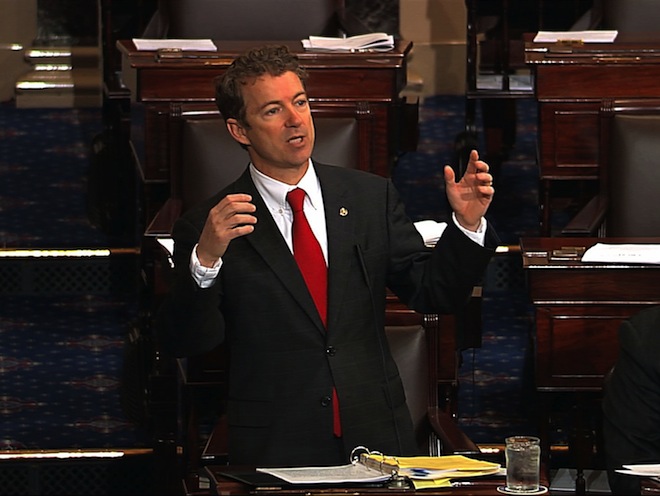Rand Paul-style filibusters are rare enough occurrences in the Senate that many of the people watching his unfold yesterday were unaware they still happened at all.
But it’s even more uncommon for an effort like that to succeed. And yet, Paul’s did.
I want to address why.
Part of the reason — a big part — is that Paul wasn’t asking for much. He wasn’t trying to quash the Brennan nomination; he just wanted some information. And the difficulty appears to have been rooted in Paul’s own difficulty articulating precisely what information he was seeking.
But that doesn’t explain why senator after Republican senator came to Paul’s aid last night, and why it looked, at least briefly, like Brennan’s nomination might be on hold for a while.
This will disappoint opponents of President Obama’s drone policy, but the reason Paul’s filibuster was different has very little to do with the merits or the popularity of his views about civil liberties.
Look back to 2010 when Sen. Bernie Sanders stood athwart the extension of the Bush tax cuts for about 10-hour with a stemwinder about inequality in America. It was a memorable enough speech that you can now find it in book-form on Amazon. But ultimately it had no impact at all on the legislative effort to extend the Bush tax cuts.
Now I think it’s safe to say that there are more Democrats who support mitigating inequality than there are Republicans who agree with Rand Paul on drones and civil liberties more broadly. But Paul’s filibuster was a success and Sanders’ fizzled out completely.
The reason — the sad truth in a way — is that Paul benefited from partisanship and institutional territoriality and Sanders didn’t.
Plenty of Senate Democrats supported Sanders in principle — with respect to both the abstract problem of inequality and the underlying tax bill. But they were all members of the President’s party, and he was negotiating a bipartisan plan with congressional leaders to prevent all of the Bush tax cuts expiring. They might not have liked the 2010 tax cut compromise, but opposing it meant bucking their president and the broader consensus in Congress.
Paul didn’t face any of these problems. Very few Republicans actually agreed with the policy substance in his speech yesterday. But they were more than happy to stick with him in a fight against this White House, particularly given that Paul wasn’t necessarily fighting against the consensus issue in Congress (i.e. that John Brennan should be CIA director) but for the principle that the Senate should defend its advise and consent powers. That’s ultimately what drove yesterday’s events, and why they were resolved so quickly.
Along the way Paul proved that a talking filibuster can be a very effective mobilizing tool for the minority party in Washington. That’s good news.
But now for the bad news. Yes, Paul and his erstwhile allies gave a largely ignored and controversial issue a long airing before a huge audience last night. But while the effort fed off of public opposition to Obama’s drone policy, most of the senators involved entered the fight for other reasons. And now that it’s over, the consensus that Obama’s drone policy is the right policy — just like the consensus that inequality isn’t a problem worth addressing — will continue on Capitol Hill.






